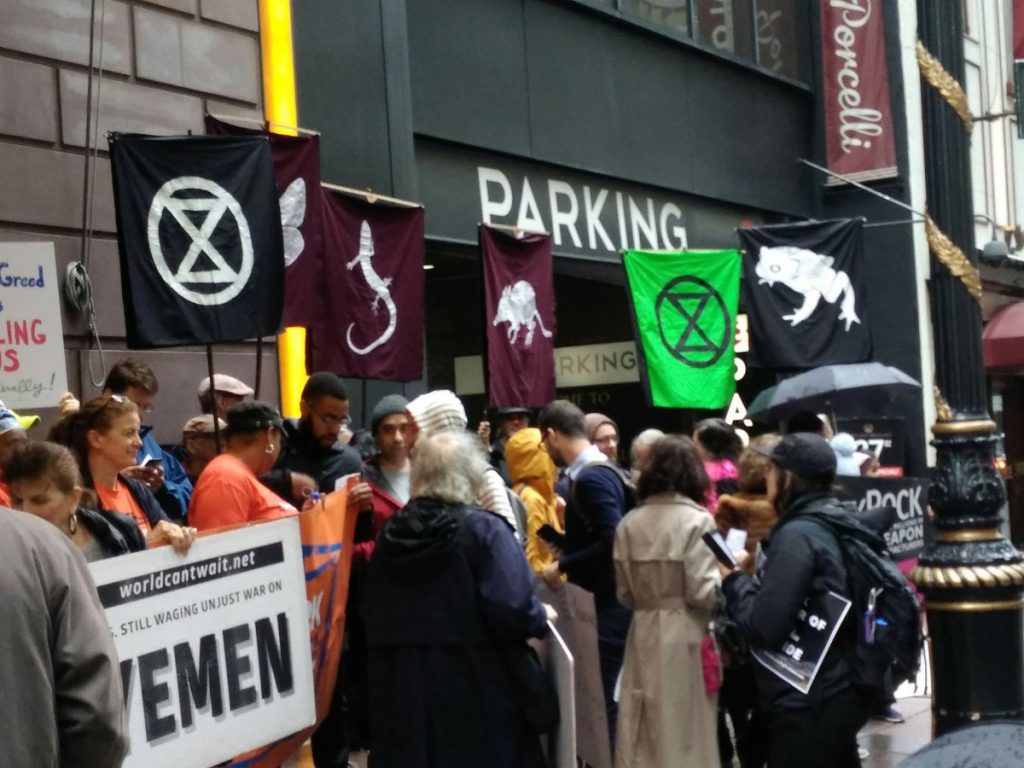Dhanada Kanta Mishra
Hyde Park, Oxford Circus, Parliament square, Piccadilly and the stock exchange were among the world famous landmarks in London that an unusual group of protesters took over last month. Calling themselves the ‘Extinction Rebellion’ or XR for short’, hundreds of non-violent protesters offered to get arrested as part of the civil disobedience. Within days, London police was at its wit’s end and UK’s Parliamentarians got together to agree to one of the three key demands of the movement — ‘to declare a climate emergency’. It was a stunning success that injected fresh life into tired environmental advocacy and action groups all over the world. Extinction rebellion groups have since sprouted spontaneously all over the world, bringing hundreds to the street.
The DNA of XR is deeply embedded in and imbued with Gandhian values and principles. Non-violence is at its core. Inner transformation, community uplift and political action are the intersecting circles that surround that core. XR Hong Kong gives the feeling that Gandhi had come alive again. He had come to inspire just like he did earlier the civil rights movement led by Dr Martin Luther King Jr and anti-apartheid struggle of Nelson Mandela.
Faced with an existential crisis that is likely to be worse than being predicted by the vast majority of climate science researchers, XR, along with the school strike led by Greta Thunberg, seem to be the last hope for humanity. Paris climate agreement called for substantial cuts in greenhouse gas emissions to limit global average temperature rise to below 2 degrees Celsius of pre-industrial levels. It also called for every effort to be made to keep temperature rise under 1.5 degrees Celsius. This had made countries such as the UK to declare a target of cutting emissions by 80 per cent to under 1990 levels by 2050 and legislate the same into law. However, the latest advice from the inter-governmental panel on climate change (IPCC) seems to suggest that unless drastic remedial action is taken by 2030, the world may have reached a point of no return. This is because of a number of tipping points, such as the melting of permafrost, releasing methane, which would accelerate the climate crisis with unpredictable consequences. The level of greenhouse gases in Earth’s atmosphere is already far above levels seen for the last several million years. The last time such an atmosphere existed, forests were growing in the polar region and sea levels were several metres higher.
The DNA of XR is deeply embedded in and imbued with Gandhian values and principles. Non-violence is at its core. Inner transformation, community uplift and political action are the intersecting circles that surround that core
XR’s operating principles include ten ideas that reflect the strong commitment to preserve planet Earth with its natural ecosystem. It reflects a deep sense of love for all living beings and nature. It emphasises a shared vision, a regenerative culture, a challenging approach to one’s self and beliefs, inclusiveness, equality, non-discrimination and decentralised self-actuation.
In a way, it mirrors the eleven principles of Gandhi that were essential for one to become a satyagrahi or an activist of non-violent civil disobedience. Naturally the first of the three demands XR makes is for governments to declare a climate emergency by ‘telling the truth’ about what climate scientists are saying. This is particularly important given the massive campaign against scientifically established fact that global heating and climate crisis results directly from anthropogenic sources.
The second demand is for governments to enact policies and laws to achieve carbon neutrality by 2025. The third but critically important goal is the establishment of a people’s assembly to direct actions to achieve the goals by 2025. The people’s assembly, also known as sortition, is a unique concept in which like a jury, ordinary people are selected by lottery to represent the population and act on their behalf, guided by expert advice. This method has proven to work well all over the world in many different contexts, to address a variety of problems at an organisational or community level. With democracies world over showing tendencies of dysfunction in electing right-wing populists such as Trump and Modi, sortition is believed by many to be the next improved version of democratic governance most suited for an equitable future for mankind.
It is becoming increasingly clear that the world is fast hurtling towards imminent self-destruction. The only hope of avoiding such a catastrophe is to re-examine the structural arrangements of modern life and transform it to a drastically low-carbon lifestyle at the earliest. The market-driven, open-ended economic growth model and profit-driven corporate culture have to change radically. Instead of financial bottomlines, corporations have to look at their emission budgets.
Individuals will have to live a life with rewards and incentives built in to our every choice to encourage low-carbon lifestyle. Governments have to drive these changes proactively with progressive legislation. Ordinary people will have to come to the streets to ensure their governments actually do so.
Thanks to XR, England, Ireland, Welsh and 558 councils covering 65 million people in 13 countries have declared climate emergency. A court in the Netherlands has ruled in favour of climate activists directing the Dutch government to increase its target to cut emissions by 17 to 25 per cent by 2020. Such a verdict has encouraged activists in many countries to bring similar lawsuits to get their governments to act.
As Greta Thunberg says, each one of us has to do our best to contribute to a world safe from the vagaries of climate crisis and ensure our children and grandchildren have a future. XR has now created a platform to achieve just that.
The writer is a civil engineering professor in India currently visiting Hong Kong University of Science and Technology as a Research Scholar. He is founder-member of XR Hong Kong and can be reached by e-mail at dhanadam@gmail.com.
